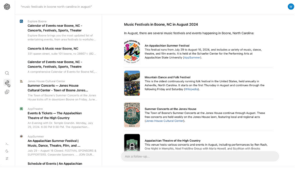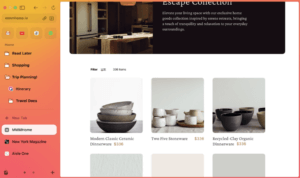2025 Digital Marketing Trends
The new year is quickly approaching, and with it, you’ll likely need to plan some new marketing strategies and tactics. With that in mind, we thought it’d be helpful to let you in on what the biggest marketing trends of 2025 will be. No, we aren’t psychic, otherwise we’d be betting on sports a la Back to the Future right now instead of writing this article. But we are really, really good at digital marketing, with an awareness of what is occurring (and about to be occurring) in the industry.
So, let’s dive in. Here are 7 digital marketing trends to expect in 2025.
1. Search Will Finally Be Interesting Again
Brace for a whole new search landscape. Gone are the days of complete Google domination. Gone is the time not so long ago, like only the end of last year/beginning of this year, when Microsoft integrated ChatGPT into its Bing search engine and tech fortune tellers predicted a huge hit to Google’s business. And Bing subsequently gained…zero percent market share, it stayed at exactly 1 percent of the search engine market.
Gone are those days! Google is finally taking some punches, and in 2025 will be truly challenged in the search landscape for the first time in more than a decade. Here’s the blow-by-blow:
AI Search
Duh, this one’s obvious, right? It’s already happening in 2024. But get ready to watch it truly take off in 2025. What we at Arc Intermedia call AI answer engines will get better at providing accurate, relevant, and current information, and users will get more accustomed to the idea of asking a chatbot a question and having a follow-up conversation until all needs are satisfied.
It won’t yet take over all searches! It is and will mostly be for educational and informative questions like “how often should I get my oil changed.” But in 2025, more users will start testing longer-tail searches like “what are the best hotels that I should consider for my vacation to Aruba in June.”
2025 will not be the year that the list of search links disappears. But it will be the year that users start experimenting with what else is out there. That means you need to read up on how to do AI optimization or hire an agency who already has. Pro tip: Having great content on your site isn’t enough any more. In order to get the attention of the AI answer engines, you’ll also need quality content on other sites. We call this content distribution.
Tools to Watch
The most obvious contender against Google, and the one that is not publicly available yet as of the writing of this article in October 2024, is ChatGPT’s search engine — SearchGPT.
ChatGPT is currently the Xerox or Kleenex of large language models (LLMs), what some refer to as generative AI. It was the first gen AI chatbot to hit the mainstream, created by OpenAI, formerly a non-profit and now very much a for-profit that just received the largest fundraising round in history and is now valued at more than $150 billion.
SearchGPT is their search engine component, and it would be a mistake to not assume they will siphon at least a portion of the search market. They already have hundreds of millions of users (the fastest to a nine-figure user-base in history), spotlight in the media, and now billions of dollars to put into promotion. They are going to hit big. And for publishers and companies worried about losing traffic to AI answer engines, they promise to provide plenty of citations and website links.

Of course, even though SearchGPT is going to have the most attention (in a direct head-to-head battle with Google’s own AI Overviews), don’t sleep on these other competitors:
- Perplexity.ai: This tool is what SearchGPT promises to be, but already exists. In the last quarter of 2024, it is gaining momentum that will continue into the new year.

- Arc Browser: Many companies are trying to rethink the browser with an AI-first approach, but Arc (no affiliation) has gotten the most attention so far. Its whole pitch is that the list of search links I referenced earlier as not going away yet are a relic of the past, ready to be replaced. Its solution is machine learning that, to put it the way Google introduced their AI Overviews, “does the Googling for you.” Enter a search query into Arc and it will find relevant information from relevant websites and bring it to you, presenting you not with links to pages but with info from those pages.

- You.com: Another up and coming AI search engine.

-
And naturally, all “minor” search engines — from Bing to DuckDuckGo to Ecosia — are integrating AI chat into their search bars.
AI Search Ads
With the proliferation of AI search engines of course comes the introduction of advertising. 2024 largely gave us free access to the AI search buffet (as long as you consider scraping and using the data of each of your searches free, along with the energy cost and impact on the environment), but the buffet line is closing, to decimate an already bad metaphor.
In 2025, all your favorite AI search engines will advertise to you. Google’s AI Overviews will incorporate existing paid search ads (and Google will also likely develop its own AI Overview-specific ad option). Perplexity will include ads and promises revenue sharing on content it sources. All these tools beginning to compete with Google need to make money, especially considering the incredible expense of creating and running LLMs. So users, get ready for AI search screens to become cluttered with ads, and marketers, get ready to learn how to do advertising effectively on an all-new platform.
Social Media Search
We just discussed the way AI search engines are looking to knock down Google, but they aren’t the only bruisers slipping on the gloves. Enter social media platforms.
Buoyed by shifting behavior amongst their own users, social media platforms like TikTok and Instagram have started attempting to become search engines themselves. Their algorithms are changing to function very much like Google’s: hashtags are being devalued in place of long-form content (as well as captioned videos) that is rich in targeted keywords. As a result, users can now enter a full search into a social media platform and receive a number of relevant results.
This means some users, for some searches, are beginning to go to TikTok or Instagram instead of Google. The numbers are small right now, but this is a prediction article, and the prediction is that in 2025 it will grow.
2. Digital Video Ads Will Surpass Broadcast Advertising
Look, broadcast TV advertising had a good run. It was cool — you could run a specific ad during a specific program and hope that it was reaching the right eyeballs.
The key word there was “hope.” And first, let’s be clear — broadcast TV is not going away. Just look at the massively insane new sports broadcast contracts. But one of the reasons the sports contracts are so high and long-term (see the recent 11-year NFL deal), is to make up for diminishing ad revenue elsewhere.
The problem, of course, is that streaming stole their idea. Say hello to Upfronts from Netflix, Amazon, and the rest. What are Upfronts? It’s when TV networks pitch their upcoming shows and start signing advertisers right then and there.
In 2024, marketers learned that CTV and OTT can be effective. CTV and OTT means, in essence, running video ads during streaming programs and on streaming TVs and boxes. Think Netflix and Hulu and Disney+, and to a lesser extent (no offense…well, some offense) Peacock and Paramount+ and all the other streaming platforms, as well as devices like Roku and Samsung TVs and Amazon Firesticks and the like.
The crux is this: wherever someone could stream a show, a marketer can advertise to them. And instead of only being able to target a broadcast network or time slot or specific show, CTV/OTT lets you target a person. It doesn’t matter if they watch Love is Blind on Netflix or American Horror Story on Hulu, your ad will reach them.
Marketers learned this past year that this is viable, and it’s about to explode in 2025. We’re wrapping up the year of streaming platforms cracking down on password sharing and pivoting to ad-supported models primary, ad-free secondary or not at all. As a result, we’re heading into the year of more opportunity, thanks to there being more individual streaming accounts out there, all with more advertising on them. CTV/OTT is about to boom.
Bottom-line: Broadcast TV advertising is not actually getting replaced anytime soon, but get into the streaming video ad marketing now or get left behind.
Bonus Video Platform Additions:
Other opportunities to reach prospects while their streaming include:
- Pause ads: Reach streamers when they’re actually not streaming! Huh? Some platforms have experimented with displaying static ads on pause screens, and more (including YouTube) are joining the fray in 2025.
- Longer non-skippables: Ads that users can skip have pros and cons — on the one hand, someone may immediately skip your ad and never absorb any of it; on the other, those who watch the whole ad must be really interested, plus you often only have to pay if your ad wasn’t skipped. A somewhat workable solution was non-skippable ads, but the problem was their brevity — most were capped at eight seconds, making it really difficult to effectively tell a story. What’s the solution? Enter 15 second skippable ads. Yes, the best of both worlds is coming.
3. Reddit Will Come for Everything
Reddit went public in 2024. Now they need to justify that. Queue many changes to boost their user-base, and how much they can advertise to those users.
Searching on Reddit
Remember the section about social media trying to steal Google’s lunch? It applies to Reddit as well. Yes, Reddit struck a $60 million deal to let Google use its content (meaning the content Reddit users create), and yes, many people append “- Reddit” to the end of their Google search in order to find Reddit posts. But as more people join Reddit and become users on the actual platform, more are starting their search right in Reddit, instead of backdooring their way in through Google.
In 2025, more “regular” people will use Reddit than ever before. What I mean by “regular” people is not classic Redditors, but simply anyone who goes online or downloads an app. More of the general population will be on Reddit. In addition to that, more of the AI search engines will use content from Reddit.
Both those things mean marketers need to get their brand on Reddit in 2025. They need a presence, they need to be posting fresh content, they need to be responding to existing content. They need that little robot guy with the pom-pom hair.
Advertising on Reddit
Reddit’s advertising options are a criminally overlooked marketing opportunity. Reddit doesn’t just let you target specific users, it lets you target specific sub-reddits, or groups. For example, trying to sell a project to new moms? There are sub-reddits consisting entirely of new moms talking about being new moms. Make sure your ad is in their conversation!
4. Social Media Will Influence Direct Purchases
I’m trying to be punny with that headline, because the two huge 2025 trends for social media will be:
Micro-influencers
2024 was the year that influencers truly made it mainstream. Some of you may be reading this thinking you’ve been getting social media stars to promote your product for years, but even slow-moving B2B companies adopted the trend in 2024. Now it’s become so common to see a sponsored post that users are intentionally discounting them or tuning them out.
Enter micro-influencers. Extremely niche social media personalities with significantly smaller reaches than the high profile influencers you may have been tapping, but whose opinions can carry much more weight. Users don’t always expect their favorite smoothie recipe account to promote a sponsor, so they’re less likely to tune it out. That means you have 2025 to get super niche, before 2026 sees a full-on influencer rebellion.
eCommerce
You’ve definitely already seen this, but it’ll grow across even more platforms in 2025 — I’m talking about social media platforms looking to directly challenge Amazon and allow for transactions to occur right on their platform. Like a dress in a TikTok video? No need to click a link to find it on Amazon, just buy the dress right in TikTok. This is going to be huge.
5. Advertising Options Will Become Even More Segmented as eCommerce Platforms Fight Back
Amazon isn’t going to let TikTok steal its market. Neither will Target or Walmart for that matter. That’s why they’ve been investing billions of dollars in their own advertising platforms. You can, for example, leverage Target’s massive database of purchase data to advertise on websites that aren’t Target.com. Walmart just bought the TV company Vizio to get into the first-part streaming advertising game.
Just like how all entertainment companies cannonballed into their own streaming platforms, the ecommerce giants are getting into their own advertising platforms. Marketers will have way more options, and way more confusion. Which is why…
6. Platforms that Consolidate Will Win
Sticking with the streaming analogy, just like streaming platforms are now being combined into a sort of form of cable TV package, the marketing tool that finds a way to merge the disparate advertising platforms together is going to be very successful indeed. The ability to leverage Amazon purchase data and Target purchase data is huge. But no one wants to have to log into and manage multiple advertising platforms.
Similarly, as cookie depreciation continues to loom over the industry, large marketing tools will be the solution. Not every company can amass large amounts of actionable first-party data. In fact, most can’t. Instead, they will work with a TradeDesk-type platform that has bought globs of first-party data from elsewhere. These platforms let marketers use that robust targeting. They let you advertise across multiple streaming platforms. They work to combine many of the items discussed in this article.
This is not intending to shill for these platforms. Just recognition that they will be the future.
7. Users Will Continue to Generate Content
This one is on the list because it has to be. But it’s at the end of the list because it’s the most difficult to implement.
2024 lists promised the rise of user generated content (UGC), and it is here…sort of…in some instances. UGC is…say it with me now…any content that is user generated. That can include both on your site:
- Reviews
- Testimonials
- Videos made for TikTok and Reels
- Guest blog posts
- Anything else you can think of that comes not from the company itself, but from real users
And off your site:
- Quora
- Facebook Groups
- YouTube/Reels/TikTok
- Glassdoor
- Anywhere else you can think where users might post content about a company
The problem is how incredibly hard this is to get right. So yes, those 2024 lists and any 2025 lists that mention UGC are correct — Reddit and Quora are built on it, AI search engines value it, it will not doubt be extremely important to remain competitive in search results in 2025. But is there anything you should change about your approach currently?
You should already be soliciting reviews and featuring testimonials. If you don’t, stop reading this right now and make a plan to get reviews and testimonials featured on your website.
What can you do differently to expand your UGC to reach the 2024 promises? The three most obvious options are:
- Start #hashtag trends — very difficult to get actual reach for these unless you’re already well-known, and there’s the possibility for it going wrong if people start making negative posts. Plus, hashtags are being depreciated on some platforms as referenced earlier.
- Run contests where you offer rewards for users submitting writing or videos or tips or other content — extremely effective if you have the budget for worthy rewards
- Sell a product that naturally gets UGC — be GoPro and convince users to share their awesome GoPro-shot videos of them doing flips on BMX bikes and base jumping off cliffs
In lieu of any of those, stick with the reviews and testimonials, get more of them, and feature them everywhere:
- Get reviews on Google Business Profile and in Facebook and in Yelp and anywhere else relevant to your offerings
- Highlight those reviews on your website
- Embed testimonials through your site — don’t just have a single Testimonials page, weave them through your content
- Have written and video testimonials
- Get more of them
- Repeat
With that, you should now have a hearty roadmap for what to prioritize in 2025. Have fun! And if you need any help, did I mention we’re really, really good at it? Contact us for some expert assistance.


